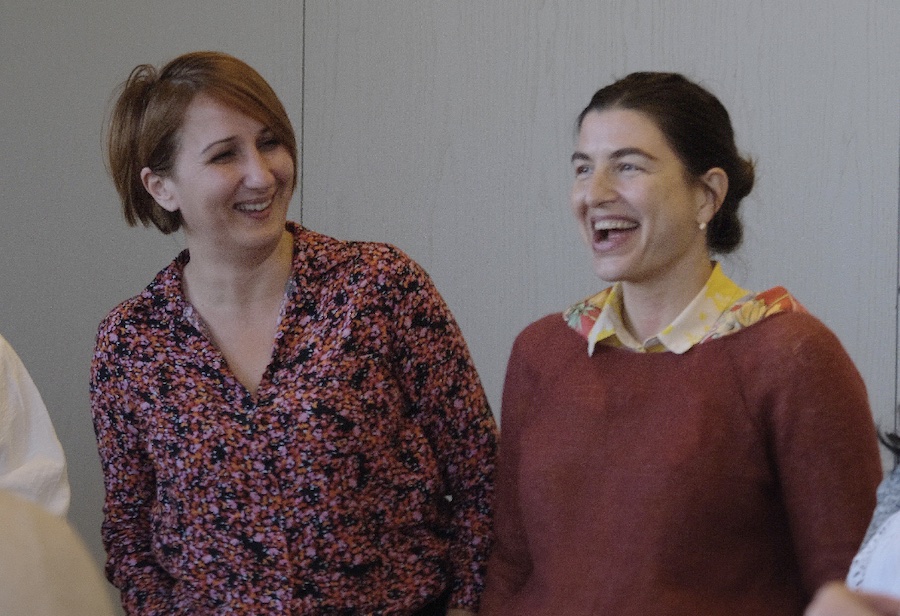. . WOMEN’S EQUALITY . .
An article from the Organization for Security and Co-operation in Europe
Bojana Mumin is one of the 12 mentees from around the OSCE area and Afghanistan, participating in the OSCE Women’s Peace Leadership Programme. The Programme aims to strengthen the ability of women to meaningfully engage and influence peace processes at all levels. It is a part of the OSCE’s flagship WIN for Women and Men project, which covers the Networking platform for Women Leaders including Peacebuilders and Mediators. The WIN project works with OSCE-supported networks and gives rise to new networks, fostering women’s participation and leadership, as well as broader men’s engagement in achieving gender equality.

Bojana Mumin (left), during the kick-off week of the OSCE Women’s Peace Leadership Programme with Irma Pidtepa, a Mediator and participant from Ukraine. (OSCE/ Vera Djemelinskaia)
An experienced peacebuilder, Bojana has been supporting peacebuilding organizations in Bosnia and Herzegovina (BiH) through her advocacy work at the Kvinna till Kvinna Foundation, which promotes women’s rights in conflict-affected areas. The work of the Foundation’s 140 local partners span the Middle East and North African region, sub-Saharan Africa, the South Caucasus, and Europe. Bojana is focusing on achieving lasting peace in her own country through the implementation of the Western Balkans EU Advocacy Strategy.
The necessity of continuous learning
I am experiencing the repercussions of what happened 30 years ago on a daily basis. Peacebuilding is more than a profession; it is something to which I am personally connected.
As someone who has been supporting local peacebuilding initiatives in Bosnia and Herzegovina for more than 16 years, I know that this work, above all, requires motivation. This is not an easy process and very often we feel exhausted. There is a lot of divisive political language, and even hate speech, dominating the public spaces, with peace rhetoric mostly missing from the political agenda. This complicates the work of the peacebuilders and, honestly, it is simply tiring.
(Article continued in right column)
Do women have a special role to play in the peace movement?
(Article continued from left column)
I also constantly need to learn how peacebuilding is approached in different contexts: what are the good practices, and what didn’t work. Unsuccessful stories are especially valuable. I am grateful to be able to pass on these lessons and learn others’ challenges and perspectives within the OSCE Women’s Peace Leadership Programme (WPLP). We worked through real-life and hypothetical scenarios, sharing how we would approach the challenge and reflecting on the different solutions. It is a win-win because I see how others find my experience helpful too.
What brings peace that lasts
‘Peacebuilding’ as a word is worn-out in our context. Over the years, there have been different peace initiatives, programmes, and actors coming to do the peacebuilding work and contributing to some extent to creating a better society, but we still live in very divided communities. There are three different narratives in Bosnia and Herzegovina based on ethnicity. Now when I have kids and I realise that if we were not doing this work, one of these narratives would become a part of their education. But now we have actors who offer alternative narratives. I am proud that there is a civil society working on peacebuilding in Bosnia and Herzegovina and that I am part of it.
Through a feminist lens
Being a feminist and a peacebuilding activist is an important part of my identity Being a peacebuilder is not popular, so taking on this identity is quite an achievement for me.
In our country, it is usually seen as something that women work on. During the 90s and early 2000s, peacebuilding was receiving a lot of support from international donors and many men were engaged. However, when donors shifted their focus to other areas, women were the ones who actually stayed in the field. Women were the first peacebuilding actors in Bosnia and Herzegovina: they were the pioneers and now they are the seniors.
Being part of Women’s Peace Leadership Programme
I now have ‘sisters’ from different regions I can reach out to for assistance, but above all, for information – sometimes this is all that is needed. It gives you a different perspective when you read reports and when you hear directly from the people who were there.
Let me give you an example. I tried to understand better the situation in Afghanistan, so I wanted to speak to a local woman who was in the conflict and could share how this experience influenced her and the community. And here I am, speaking in person to one of the WPLP participants from Afghanistan, Elham Kohistani, and other women peacebuilders from so many different regions about their experiences in mediation, leadership and peacebuilding efforts. This is one of the key benefits of being part of this programme: knowing that I can tap into the expertise of this incredible network of women leaders and also offer my support should anyone need it.